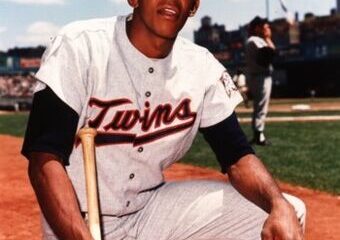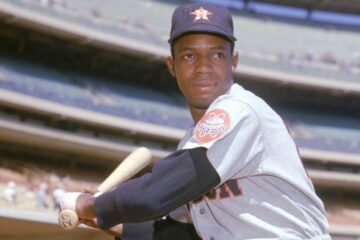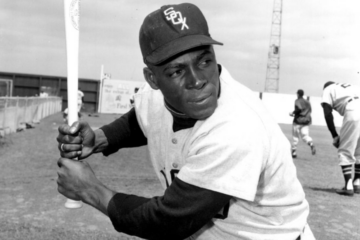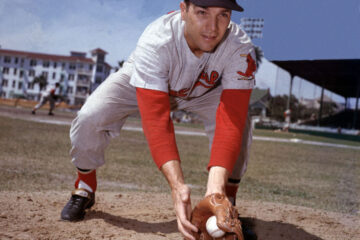The Hall of Fame Index: Was Willie Mays better than Mickey Mantle?
Being stuck at home with no baseball affords a man plenty of time to read. I dusted off Clearing the Basesby Allen Barra to see if the debates in that book would spark a iittle interest. It did. So, I’ve decided to write a few pieces centered on the debates from that book. We hope to have baseball back by the end of the month and we can return to fantasy coverage then. Hopefully, this can serve as a tiny distraction until that time comes.
It has to be noted that the book was published in 2002. That comes with a couple of definite caveats. First, I cringe at many of the things I wrote in 2002. That’s when my first book (Checks and Imbalances) was published. It’s a good book, but many of the statistical principles are elementary. The second major caveat is that our collective understanding of sabermetrics is much more advanced now than it was then.
So, I want to cut Barra a lot of slack before we even get started. This isn’t meant as an insult to his analysis because I’m sure my analysis wouldn’t have been worth the paper it was printed on in 2002. However, I would love to apply the index and its various tests to each debate. We start with maybe the most popular one. We will focus today on the battle between Mickey Mantle and Willie Mays.
Career Value
| BWAR | FWAR | WS/5 | Total | |
| Willie Mays | 156.2 | 149.9 | 128.4 | 434.5 |
| Mickey Mantle | 110.2 | 112.3 | 113.0 | 335.5 |
We won’t spend too much time on career value. Barra acknowledged the obvious point that Mays was more valuable than Mantle on a career basis. He played an additional five seasons and was generally healthier throughout his career. He did miss a couple of seasons in the early part of his career serving his country, but otherwise this wasn’t the source of the debate.
The source of the debate was who was the best player when the players were both at their best? This is a hard question because it is so imprecise. How do we define when they were at their best? The index takes the top ten consecutive seasons. Other systems take seven seasons. Some make it up as they go along. We will start with the definition of peak value as the index defines it and then go from there.
Peak Value
| BWAR | FWAR | WS/5 | Total | Index | |
| Mays | 96.3 | 92.1 | 75.0 | 263.4 | 697.9 |
| Mantle | 84.0 | 89.7 | 84.2 | 257.9 | 593.4 |
So, this ends up a lot closer. However, we have to admit the limitations of our own formulas. The index was never designed to definitively establish who the greatest players were. It was made to determine whether a player was fit for Cooperstown. It’s obvious both of these guys are fit. Determining who was the greatest player was when they were at their best is an entirely different game. The index skews the results some unintentionally because both of these players had different career arcs.
Mantle’s greatness was bottled up within the ten-year time frame. He had a couple of good seasons beyond that, but most of it came within those ten seasons. Mays great seasons were more spread out because he was greater for longer. So, it is impossible to take his top ten consecutive seasons without leaving out a few gems. So, I am altering my methodology from here on out. When we look at hitting and fielding, we will look at each player’s ten best seasons. We will also add a few numbers along the way.
Offensive Numbers
| RC | OPS+ | Rbaser | OW% | |
| Mantle | 1450 | 190 | 48 | .840 |
| Mays | 1424 | 170 | 56 | .788 |
So, the first major supposition in Barra’s book was that Mantle was the superior offensive player. We could add some more stats like wOBA and wRC+, but I suspect they would tell us the same thing we see here. Mantle got on base more efficiently and therefore was pound for pound the more efficient run producer and offensive player.
The statistic we added paints a pretty clear picture though. Mantle created an average of 2.6 runs more per season than Mays over the course of their best ten seasons. That’s obviously not a whole lot. In WAR and win share terminology, ten runs equal one win. So, that means that he was worth less than one win a season more during his prime offensively.
Interestingly enough, Barra spent a great deal of time highlighting how some of the ideas we commonly had about both players were wrong. You can see Mays doesn’t have a huge advantage on the bases. Of course, Mays was more effective for longer. Mantle’s numbers begin to fall off a cliff in that department outside of these ten seasons. We also purposely stacked the deck by taking the top ten seasons in each category on their own instead of picking the same ten seasons. To illustrate what is going on offensively I need to introduce another number to you. It does figure prominently in my book The Hall of Fame Index Part II.
Bases Per Out
| TB | BB | HBP | SB | Outs | BPO | |
| Mantle | 4511 | 1733 | 13 | 153 | 5899 | 1.086 |
| Mays | 6066 | 1464 | 44 | 338 | 8056 | 0.982 |
These are obviously career numbers. It is incredibly rare to average more than one base per out over the course of a career. Only a handful of players in history have managed to do it. Mays comes pretty close, but he doesn’t quite get there. The obvious differences is in the number of walks. Mays has nearly 2200 more outs than Mantle because of those five additional seasons and general good health. Mantle still has nearly 300 more walks.
So, we will concede the argument that Mantle was the better hitter when both players were at their best. However, that’s not the whole argument. The whole argument was whether Mantle was a more valuable player overall when they were at their best. So, we will do the same thing we did with fielding that we did with hitting.
Fielding Numbers
| Rfield | DWAR | TZOF | DWS/5 | |
| Mays | 159 | 16.6 | 161 | 11.8 |
| Mantle | 26 | 1.2 | 22 | 9.1 |
This is where the rubber meets the road. Mantle was a decent enough center fielder. He could charitably be called above average when he was at his best. Mays was absolutely brilliant. This is the spot where Barra’s analysis broke down. Again, this is due to lack of information and not bad analysis necessarily. He was left to estimate the number of runs that Mays defense may have been worth.
We see 133 runs difference according to Rfield and 139 runs difference according to total zone. These are the best ten seasons only. That would explain why he was worth 15 more wins over the course of those ten seasons according to defensive WAR. It would also explain why Mays ends up being more valuable overall despite not being quite as good offensively.
Playoff Numbers
| PA | SLASH | HR | Runs | RBI | SB | |
| Mantle | 273 | .257/.374/.535 | 18 | 42 | 40 | 3 |
| Mays | 99 | .247/.323/.337 | 1 | 12 | 10 | 3 |
Postseason performance is not an official part of the debate, but you can’t avoid the way that perception sneaks into these discussions. Mantle spent his prime in the World Series. Had he gone through league championship series and divisional playoff rounds he would likely have more postseason home runs than any player in history. As it stands, he has the most home runs in World Series play.
Mays was not nearly as good. He also had fewer opportunities. He advanced to the World Series in his first season as a big leaguer and in his last season as a big leaguer. Had he made it during his prime we would likely be looking at different numbers. So, it doesn’t prove anything, but it does explain why we think what we think.
BWAR MVP Points
| Top 10 | Top 5 | MVP | PTS | |
| Mays | 1 | 4 | 10 | 123 |
| Mantle | 0 | 5 | 6 | 90 |
These are two of the greatest players in the history of the sport. When you go through the BWAR MVP points you find only a few players in history that deserved ten or more MVP awards in their career. Many call Mays the best player of all-time because he was the last player to do it. Others include Rogers Hornsby, Honus Wagner, and Babe Ruth. When you start talking about greatest players you end up bringing a number of factors into play. This is why I choose to focus more on who was the most dominant.
Mantle is certainly up there. There aren’t many players that deserved six MVP awards. Ty Cobb wasn’t able to do it and there are some that would consider him the most dominant player of all-time. The question originally was who the best player was during their prime. It is pretty close, but Mays has to get the edge because of his awesome fielding advantage. It was definitely a fun debate. Stay tuned for more.





